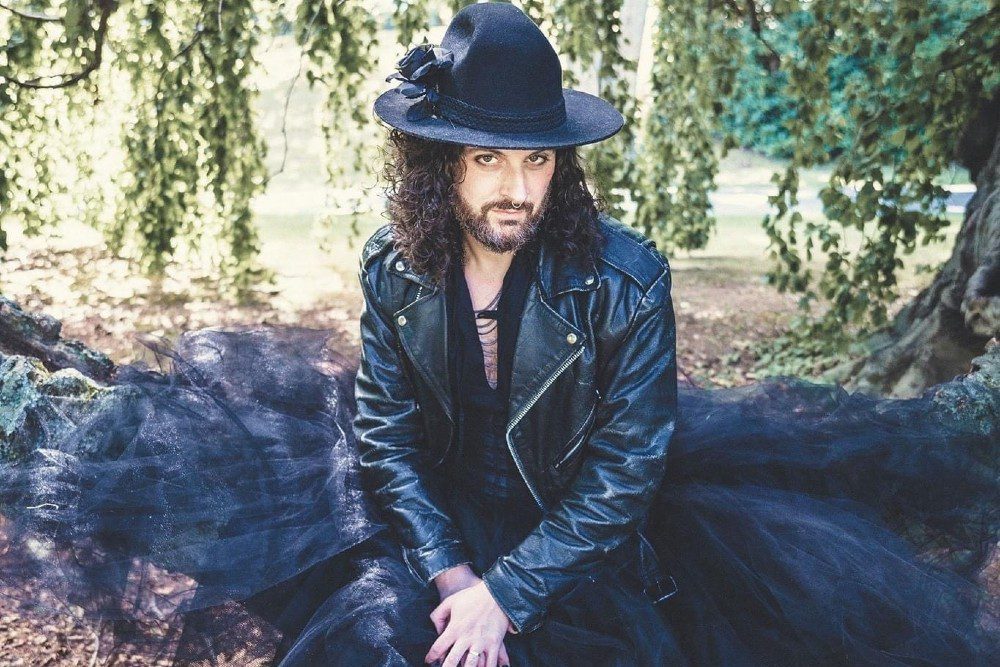

Jessye DeSilva never intended for religion to emerge as a thread in their songwriting. With their new record, Hover, a five-track project bubbling with witchy incantations and soul, DeSilva was able to “channel some of that hurt” born out of their youth growing up in the church. “All the things that make you who you are end up coming out in your music,” the singer-songwriter tells Audiofemme.
DeSilva’s father was a pastor, and Sunday services were a natural part of life, if not an obligation. But DeSilva took full advantage of any opportunities to perform, from taking piano lessons to singing and playing in various services. “My relationship with the church has been really complicated,” they admit. “I really owe a lot of my growth as a musician to the church. I think church folk were the first to encourage me and show me that I had some sort of talent that was worth nurturing.”
However, many churchgoers were quick to turn on them when they learned DeSilva was queer. “I had been the talented preacher’s kid, and suddenly they were afraid for their children to be alone with me,” they remember.
DeSilva’s father rallied behind his child and “really did a lot of soul-searching when I came out. And he got to this place of radical acceptance and affirmation of me and the queer community, which is really a beautiful thing,” DeSilva recognizes. “I think to this day, my baggage isn’t with faith itself so much as what people have done in the name of their faith.”
As we’ve seen over the last four years, “religious extremism [has become] interwoven with politics and social issues,” and unlike ever before, DeSilva finds themselves reevaluating their upbringing, meanings of faith, and gaslighting.
A song like “Something Wicked,” for instance, referencing the iconic “something wicked this way comes” line from “Macbeth,” firmly uproots the “sense of collective gaslighting” that reared its head during the Brett Kavanaugh hearings. “For me, what was going on there triggered some religious baggage with me, even though the trials weren’t overtly religious,” DeSilva explains. “It felt very similar, the way that I was feeling, in how the public was being gaslit. It felt a lot like the religious gaslighting I grew up with. That whole period culminated in me taking the song and turning it into an anthem. I wanted to own what made me wicked in certain people’s eyes.”
“It’s coming for your vanity/It’s coming for your guns/It’s coming for your bigotry/No matter where you run,” DeSilva snarls, spooky harmonies rattling like chains around them. Later, they firmly regain their worth with this moon-bound creed: “A change is gonna come…”
DeSilva’s emotions run red-hot, particularly with the title track. Written around the fourth anniversary of their partner’s mother’s death, the Boston musician attempts to make sense of grief and the afterlife and whether we, mere mortals, can lift the veil between worlds; their mournful lyrics slip from their tongue: “Come and stay by my side/When the cold moves in/Nights are long, nights are long/And my mind’s prone to wandering.”
“It was the first time I had been so close to that kind of grief before. I’ve lost close friends and grandparents. I have yet thankfully to lose my own parents,” they reflect. “Being with [my partner] through that was really difficult. I wasn’t able to empathize in a direct way with him. I wasn’t able to fix it. I didn’t know what to say.”
DeSilva had also been fascinated with a podcast called Unobscured at the time. The second season delved into the spiritualist movement of the 1800s, when mediums broke into mainstream culture. “I was thinking about whether or not we really can communicate with the dead,” they continue. “I think we keep people alive through our memory. Whether there is a literal afterlife, I don’t know how I feel about that.”
Hover also offers up a bit of encouragement with “Worry,” a personification of DeSilva’s mental health tug-o-war as a plucky, front porch tune. “Leave your key by the front door/Take your dirty shoes off my clean floor/Keep moving on,” they sing, encouraging themselves to look to the horizon.
“I have very few songs where I don’t remember the writing process that much because I sat down and finished the song in one go. It’s pretty rare, but it’s also really awesome when that happens. This was also one of those rare instances where I had a melody in my head before lyrics,” they offer. “I had this simple folk structure in terms of the melody and rhyme scheme I wanted to play with.”
DeSilva had recently read author Mary Oliver’s “I Worried,” a poem in which she speaks directly to her anxiety. “That whole idea really vibed with me,” says DeSilva, who then turned their own mental health struggles into a “semi-abusive lover” for the song.
Hover is DeSilva’s second project, the follow-up to 2019’s Hoarfrost and Crocus Shoots. The former is marked with palpable boldness in melody, lyrics, production, and vocal prowess. Yet DeSilva still wrangles with their songwriting gifts. “I think what’s difficult is letting it be enough. I have this tendency to worry, especially when something just comes to me, that it’s not interesting enough or that it’s too simple,” they confide. “I get really tempted to throw in some fancy, weird chord or to add another adjective or metaphor to the lyrics. I look at songwriters like Brandi Carlile who can say something so profound but say it in a way that’s just how people talk. It doesn’t always sound like flowery poetry. It sounds like a heart-to-heart conversation with someone. I still feel like I can’t do that.”
Still, there’s an intrinsic optimism to Jessye DeSilva’s music that adds buoyancy to the weighty topics they address. “I kind of write myself in my music the way I want to show up in the world. I find a way to empower myself through my songs,” they explain, citing Stevie Nicks as a big influence. “She has this way in all of her songs of dealing with her heartache but at the same time having this feeling that ‘things really suck right now but I know I’m going to be okay.’”
Follow Jessye DeSilva on Twitter and Instagram for ongoing updates.




